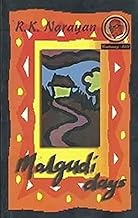
Original Title
Malgudi Days
Subject & College
Series
Publish Date
2006-01-01
Published Year
2006
Publisher, Place
Total Pages
256
ISBN
978-0143039655
Format
Paperback
Country
India
Language
English
Readers Feedback
Short story that transports readers
Ku. Sayali Arun Jadhar, T.Y.B.A., Dept.of English , Annasaheb Awate College, Manchar Malgudi Days, written by R.K.Narayan is a collection of short story that transports...Read More
Ku. Sayali Arun Jadhar
Short story that transports readers
Ku. Sayali Arun Jadhar, T.Y.B.A., Dept.of English , Annasaheb Awate College, Manchar
Malgudi Days, written by R.K.Narayan is a collection of short story that transports readers to the fictional town of Malgudi nestled in the heart of India. First Published in 1982, this book is a masterpiece of Indian Literature offering a glimpse into the lives of ordinary people living in a small town.
The book comprises 32 short stories each unique and captivating in its own way .The stories revole around the lives of the people of Malgudi, exploring themes such as love, family friendship and the human condition from the nostalgic tale of ‘A Horse and Two Goats’ to the poignant story of ‘The Doctors Word ‘eachnarrative is a window into the complexities of human relationships.
Narayan explores various themes throughout the book including:
i) The simplicity of life: Malgudi Days celebrates the simplicity and beauty of life in a small town where people live in harmony with nature.ii) Human relationships: The stories highlight the complexities of human relationships, showcasing the depths of love friendship and family bonds.
iii) Social commentary: Narayan subtly weaves social commentary into this stories touching on issues like poverty inequality and the struggles of everyday life.
The characters in Malgudi Days are well crafted and relatable, with each story featuring a new cast of characters Narayans characterization is remarkable as he brings to life the people of Malgudi, making them feel like old friends.
Malgudi Days is a timeless classic of Indian Literature offering a glimpse into the lives of ordinary people living in a small town. Narayan’s masterful story telling coupled with his insightful exploration of human relationships, makes this book a must- read for anyone interested in literary fiction. Malgudi Days is suitable for readers who enjoy literary fiction, short stories and tales about everyday life.
Malgudi Days
(Review by Bobade Maithili Nagesh FYBHMCT Student MAHARASHTRA STATE INSTITUTE OF HOTEL MANAGEMENT AND CATERING TECHNOLOGY AND RESEARCH SOCIETY, PUNE) Setting and Theme: Malgudi Days...Read More
Bobade Maithili Nagesh
Malgudi Days
(Review by Bobade Maithili Nagesh FYBHMCT Student MAHARASHTRA STATE INSTITUTE OF HOTEL MANAGEMENT AND
CATERING TECHNOLOGY AND RESEARCH SOCIETY, PUNE)
Setting and Theme:
Malgudi Days is a collection of 32 short stories set in the fictional town of Malgudi, which mirrors the simplicity and complexity of rural India.
The central theme revolves around everyday human experiences, exploring emotions like love, fear, hope, and despair in ordinary settings.
Characterization:
The book presents a variety of relatable characters such as children, teachers, shopkeepers, and farmers.
Despite their ordinariness, Narayan’s characters are deep, with rich internal lives that highlight universal human experiences.
Understanding Human Nature:
Narayan’s stories delve deeply into the complexities of human behaviour and emotions, such as love, guilt, ambition, and fear. Reading Malgudi Days offers readers a better understanding of the intricacies of human nature, with its flaws, strengths, and contradictions.
Cultural Insight:
The book provides a unique window into the life of small-town India during the early 20th century. It reflects the socio-cultural landscape of rural India, including family dynamics, traditions, and local customs. For readers unfamiliar with Indian culture, it’s an excellent introduction to the way people lived in that era.
Exploration of Rural Life:
Narayan captures the essence of rural India, reflecting the lives of small-town folk with authenticity.
Through his stories, readers experience the quiet rhythms of life in Malgudi, with themes of community, tradition, and daily struggles.
Moral Lessons:
Many stories contain subtle moral lessons, encouraging introspection about the values of honesty, kindness, and perseverance.
Characters often undergo personal growth or face ethical challenges, reflecting the complexities of human nature.
Appreciation for Simplicity in Storytelling:
Narayan’s writing is simple, yet profound. The straightforward narrative style invites readers to appreciate the beauty of simplicity in storytelling. His ability to convey complex emotions and ideas through simple language is a skill that many can learn from.
Exploration of Universal Themes:
While the stories are set in a specific cultural and geographical context, the themes they explore are universal. Issues like the quest for identity, family relationships, moral dilemmas, and the tension between tradition and modernity are still relevant today, making the book appealing to readers from diverse backgrounds.
Humour and Depth:
Narayan balances humour with depth, using light-hearted moments to illuminate more profound emotional truths.
Stories like “Swami and Friends” and “The Vendor of Sweets” combine wit with reflection on the complexities of life.
Impact and Legacy:
Malgudi Days remains a classic of Indian literature, offering readers both entertainment and reflection.
Its lasting appeal lies in its accessibility, as the simple narrative style and universally relatable themes transcend time and place.
Conclusion:
Malgudi Days is an enduring collection that masterfully portrays the human condition through its charming and insightful stories.
It is a must-read for anyone interested in exploring human nature, Indian culture, and the art of storytelling.
